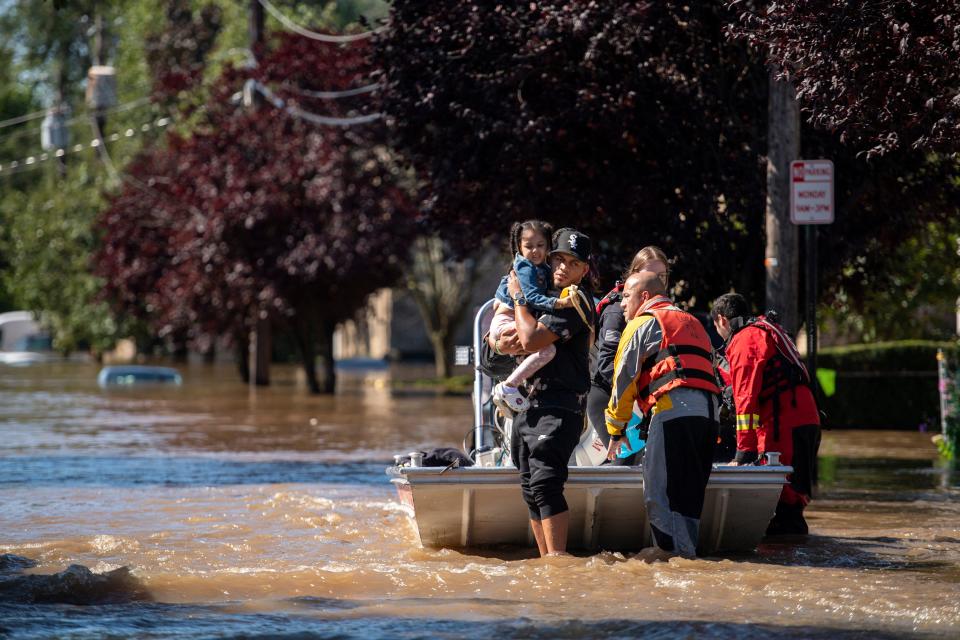Here's how New Jersey residents really feel about climate change. Hint: They're annoyed.
- Oops!Something went wrong.Please try again later.
New Jersey residents are more dissatisfied than not with just about everyone's response to climate change, according to a new poll from the Eagleton Center at Rutgers University.
Residents polled in October by the center, before the 10th anniversary of Superstorm Sandy, predominantly found fault with groups ranging from the federal, state and local governments to car manufacturers and the media in addressing environmental conditions credited to climate change. The majority also backed carbon emission reduction pledges, dedicated state funds for climate change preparedness efforts, and the use of public money to replenish and widen beaches.
Still, those polled were less keen about taking on the costs of actions they believe would benefit an environment disrupted by climate change, said Ashley Koning, an assistant research professor and director of the Eagleton Center.
Story continues after gallery
"The paradox of the past decade remains," Koning said. "Residents wholeheartedly want to see more climate-related action but do not want to be personally burdened with the responsibility."
In a time of rising inflation, residents are expecting companies using and producing fossil fuels and government entities to pick up the slack, said Jessica Roman, a research associate at the center.
A decade after Sandy, devastated Meadowlands towns still adding defenses, still vulnerable
Despite concerns about climate change as an environmental threat, more than half of respondents said New Jersey is at least somewhat prepared to manage increasing temperatures, rainfall, flooding and sea level rise. Three in four said the state is at least somewhat prepared for a weather-related disaster at the magnitude of Hurricane Ida or Superstorm Sandy in the next five to 10 years, according to the poll.

Sandy was an extratropical cyclone when it made landfall in New Jersey on Oct. 29, 2012. It brought 80-mile-per-hour winds, nearly a foot of rain and a storm surge of nearly 9 feet to parts of the Jersey Shore. Tens of thousands of homes were damaged. Millions lost power. More than 30 people died. State officials blamed Ida for nearly as many deaths after its remnants came through the Garden State in early September 2021.
To help protect inland flood zones from future severe rain events, Gov. Phil Murphy and other state officials on Oct. 27 announced plans to update New Jersey's flood hazard and stormwater regulations. The state's current flood maps are based on data last updated in 1999. Moreover, recent studies commissioned by the state have projected more intense rainfall events in the future, putting riversides increasingly at risk, they said.
NJ sues oil, gas companies alleging they deceived public over climate change
"Our policy decisions must be informed not by obsolete data, but by the challenging realities currently facing residents and businesses across the state,” Murphy said.
One New Jersey-specific study, released in November 2021, found that extreme precipitation amounts in the state were as much as 15% higher than the 1999 data suggests.
More than half of those polled by the Eagleton Center said they are seeing storms like Ida and Sandy more often than they did 25 or 30 years ago. Nearly two in three said they are more frequently seeing extreme flooding.
Among registered voters polled, roughly two in three said the issue of climate change is either very or somewhat important to their vote in the November 2022 elections. Fewer than one in three said it was either not very important or not important at all.
Another poll from the center nonetheless showed that few voters (2%) likely have environmental issues as their main concern when it comes to the considerations involved in casting a ballot. Inflation, taxes and women's rights are commonly seen as more pressing issues, according to that late-summer poll.
Local NJ officials schooled on mandated plans for climate change-related events
The Eagleton Center poll on climate change ran from Oct. 14 to Oct. 22. It interviewed 1,002 state residents, records show.
Some other results:
Nearly four in five polled said they believe Earth’s climate is changing. Almost the same ratio said changing climate conditions pose a serious threat to New Jersey.
Nearly seven in 10 said they support requiring home and business owners in at-risk areas to buy flood insurance.
Eight in 10 said the government should have to account for changing climate conditions and extreme weather events when making large infrastructure investments.
More than eight in 10 said they support regulatory standards for development in flood-prone areas, municipal plans for hurricanes and floods, and investments in wetlands and trees to buffer climate change impacts.
This article originally appeared on NorthJersey.com: Climate change in New Jersey: Here is how residents feel

